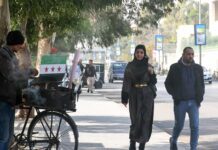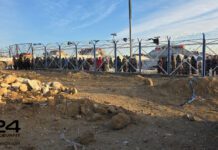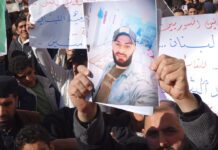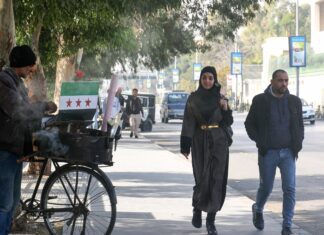
The air in Daraya still carries the echoes of grief. Hussam Makiya, a survivor of the Daraya Massacre, remembers the weight of a shovel in his hands, the silent horror of burying neighbors, friends, and family in hurried graves.
“The perpetrators of this massacre have not been held accountable,” he told Levant 24 (L24). “This lack of justice has led to the disintegration of social ties and increased feelings of insecurity.” But the pain has also fueled a collective determination: a resolve to ensure that accountability is not lost in the chaos of transition.
As Syria steps into an uncertain future following the collapse of the Assad regime on December 8, the question of justice looms large. Can a nation that has endured mass killings, systemic torture, and forced disappearances navigate the delicate balance between retribution and reconciliation? Or will the pursuit of justice become a source of renewed division, a cycle of vengeance under a different banner?
The Pursuit of Justice & the Pitfalls of Selectivity
For many Syrians, justice means prosecuting the architects of war crimes—the figures who orchestrated massacres, ordered chemical attacks, and oversaw the torture chambers of Sednaya Prison. But in practice, the process has been uneven. The new government has pledged to uphold transitional justice, yet the sheer scale of past atrocities has forced it to make difficult decisions about accountability.
“When the new government took over, it issued amnesty to all those who were part of the regime, asking them to sign up at the various locations throughout the country,” explained Hussam Ayloush, a Syrian-American political activist, on the Thinking Muslim Podcast. “Basically, keeping in mind there were hundreds of thousands who served in the regime’s intelligence agencies and military agencies that were involved in the killing, torturing, and abusing of Syrians, it’s going to be impossible to punish each one of them.”

Ayloush emphasized that accountability efforts must focus on those most responsible for war crimes. “We have to choose. Syrians have to choose. Those who were the leading figures, the leading individuals conducting and executing the killing and the mass torture, those are the people who are going to be targeted.” This pragmatism reflects a reality in which the government must balance justice with stability as Syria rebuilds.
Global Oversight & the Role of the ICC
The arrival of International Criminal Court (ICC) officials in Damascus in early 2025 signaled a potential turning point. For years, ICC prosecution of Syrian war crimes was blocked by Russia’s veto at the United Nations Security Council. Now, with Assad gone, the new administration has pledged to cooperate with international bodies, including granting the ICC jurisdiction to investigate crimes committed under the previous regime.
Yet legal experts warn that international mechanisms alone will not be enough. “Transitional justice must operate on multiple levels,” Fadel Abdulghani, director of the Syrian Network for Human Rights. (SNHR), told L24. He outlined four key pillars: criminal accountability, truth and reconciliation commissions, victim compensation, and institutional reform. “We need all these pillars to work together,” he stressed, “because the scale of violations in Syria is immense.”

Lessons from Rwanda, South Africa, & Chile
Countries emerging from conflict have pursued different approaches to transitional justice. Rwanda, after the 1994 genocide, adopted a localized system of “Gacacha” courts, where community-led trials allowed perpetrators of lesser crimes to confess, seek forgiveness, and reintegrate into society. This model, some argue, could help Syria address lower-level offenses while reserving formal prosecutions for the most egregious crimes.
South Africa’s Truth and Reconciliation Commission (TRC) offered another path. While it allowed amnesty for those who fully confessed their crimes, it ensured that historical atrocities were documented and publicly acknowledged. A similar approach in Syria, experts suggest, could help establish a national record of human rights violations, preventing future regimes from erasing past crimes.
Chile’s post-Pinochet era focused on uncovering the truth and compensating victims, ensuring that the horrors of the dictatorship were memorialized. In Syria, this could mean turning notorious detention centers like Sednaya into memorial sites, a step already being discussed by human rights organizations.
The Survivors’ Struggle
For the tens of thousands who suffered under Assad’s brutal security apparatus, justice is not an abstract concept—it is a daily fight for recognition, support, and restitution. The newly formed Syrian Revolution Detainees Association, established by survivors of the infamous Sednaya Prison, aims to be a voice for those who endured the “human slaughterhouse.” Among the association’s 1,472 members, 340 are battling tuberculosis—an illness many contracted due to the appalling conditions in Assad’s prisons.
Their struggle highlights a critical aspect of transitional justice: justice is not just about punishing perpetrators but also about rehabilitating victims. Makiya echoed this urgency, emphasizing that justice must go beyond trials. He acknowledges the need for prosecution through fair and transparent courts, but also stressed there must be “reparation mechanisms that help rebuild their shattered lives.”

The Fragile Path Forward
The road ahead for Syria is fraught with challenges. The sheer scale of crimes committed makes full accountability difficult, if not impossible. Prioritizing prosecutions for the worst offenders while seeking alternative justice mechanisms for lower-ranking participants may be the only practical approach.
Moreover, Syria’s new leadership must guard against the temptations of revenge and the risk of a return to systemic violations, which, says Abdulghani, is dependent upon the reformation of institutions. “Reform primarily targets the institutions that committed violations: the army, military, security and intelligence agencies, and the judiciary. These institutions must be restructured, and those involved in violations must be removed.”
It’s imperative, he emphasized, that individuals known for integrity act as authorities in these agencies and that they are subordinate to a strong and functional judiciary. “If we do not dismantle the structures that legitimized their impunity,” warned Abdulghani, “then accountability will not be meaningful.”
The coming months will determine whether Syria can craft a justice process that is both credible and inclusive. For now, survivors like Hussam Makiya continue to hope. “We expect the new government to bring justice to the martyrs,” he said. “Because without justice, there can be no peace.”








